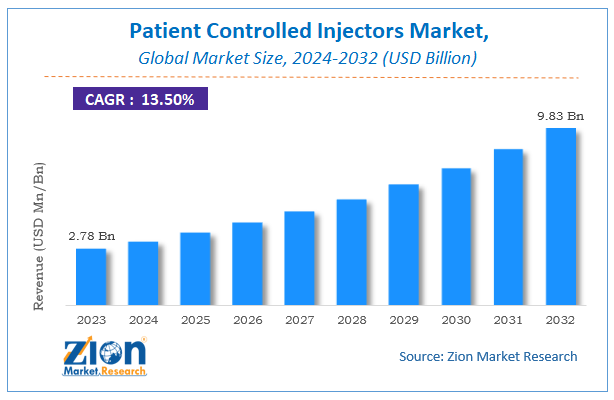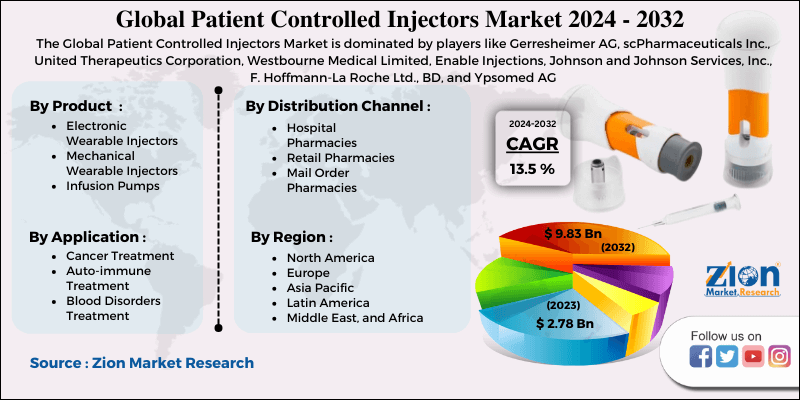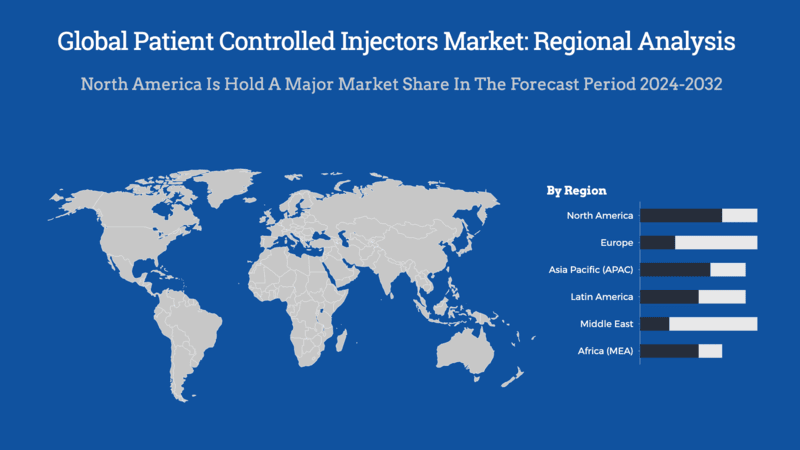Patient Controlled Injectors Market Size, Share, Trends, Growth 2032

Patient Controlled Injectors Market By Application (Cancer Treatment, Auto-immune Treatment, and Blood Disorders Treatment), By Product (Electronic Wearable Injectors, Mechanical Wearable Injectors, and Infusion Pumps), By Distribution Channel (Hospital Pharmacies, Retail Pharmacies, and Mail Order Pharmacies), and By Region - Global Industry Perspective, Comprehensive Analysis, and Forecast, 2024 - 2032
| Market Size in 2023 | Market Forecast in 2032 | CAGR (in %) | Base Year |
|---|---|---|---|
| USD 2.78 Billion | USD 9.83 Billion | 13.5% | 2023 |
Patient Controlled Injectors Market Insights
According to Zion Market Research, the global Patient Controlled Injectors Market was worth USD 2.78 Billion in 2023. The market is forecast to reach USD 9.83 Billion by 2032, growing at a compound annual growth rate (CAGR) of 13.5% during the forecast period 2024-2032. The report offers a comprehensive analysis of the market, highlighting the factors that will determine growth, potential challenges, and opportunities that could emerge in the Patient Controlled Injectors Market industry over the next decade.
Patient Controlled Injectors Market: An Overview
Patient controlled injector is the breakthrough in injection administration. The medical device helps in fulfilling the unmet requirements of patients as it offers comfort and ease as compared to any other medical equipment. Moreover, the device is ergonomically created and helps in patient in improving self-care, thereby making it easier for the patients in effectively handling & administering the medicines at a prescribed period. Apart from this, the medical device is a subcutaneous drug delivery tool adhering to the patient body along with helping in inoculating huge volumes of medicine.
Patient Controlled Injectors Market: Growth Drivers
Escalating occurrence of chronic ailments such as autoimmune diseases, cancer, and blood ailments resulting in need for elongate duration of treatment will prompt the growth of patient controlled injectors industry over the assessment period. In addition to this, utility of patient controlled injectors has assisted in mitigating risks of contamination, needle stick injuries, and reducing medical errors caused as a result of parenteral mode of medicine administration through injection. This, in turn, will promulgate the expansion of patient controlled injectors industry over the upcoming years.
Key Insights
- As per the analysis shared by our research analyst, the global Patient Controlled Injectors Market is estimated to grow annually at a CAGR of around 13.5% over the forecast period (2024-2032).
- In terms of revenue, the global Patient Controlled Injectors Market size was valued at around USD 2.78 Billion in 2023 and is projected to reach USD 9.83 Billion by 2032.
- Based on the application, the Cancer Treatment this segment holds the largest market share, driven by the increasing prevalence of cancer worldwide and the demand for convenient, patient-administered treatment options. Patient-controlled injectors enable cancer patients to self-administer medications, reducing the need for frequent hospital visits and improving treatment adherence.
- Based on the product, the electronic wearable injectors dominate the market due to their advanced features, such as dose control and automatic needle insertion, which enhance patient compliance and safety. These devices are particularly favored for their ability to deliver larger volumes of medication with precision.
- Based on the distribution channel, the hospital pharmacies represent the primary distribution channel for patient-controlled injectors. Their role in promoting medication adherence, reducing healthcare costs, and preventing infections contributes to their leading position in the market.
- Based on the region, the North America leads the global patient-controlled injectors market, accounting for a significant share. This dominance is attributed to the high prevalence of chronic diseases, a robust healthcare system, and substantial investments in advanced medical technologies.
Patient Controlled Injectors Market: Dynamics
Key Growth Drivers
The patient-controlled injectors market is primarily driven by the increasing prevalence of chronic diseases such as diabetes, cancer, and autoimmune disorders, which require frequent and long-term drug administration. The growing preference for self-administration devices, offering patients greater control and convenience, further fuels market growth. Technological advancements in drug delivery systems, including the development of smart injectors with connectivity features, enhance patient adherence and treatment outcomes. Additionally, the rising geriatric population and the growing demand for personalized medicine contribute to the expansion of the patient-controlled injectors market. Pharmaceutical companies' focus on biologics and biosimilars, which often require injectable delivery, also supports market growth.
Restraints
Despite its promising outlook, the market faces restraints such as the high cost of patient-controlled injectors, which may limit their adoption in low-income regions. Additionally, concerns regarding the safety and reliability of self-administered injections, including the risk of dosage errors and device malfunctions, can hinder market expansion. Limited awareness and lack of adequate training for patients, particularly in underdeveloped regions, further pose a challenge. Stringent regulatory requirements for the approval of new injector devices also create obstacles for manufacturers, increasing product development timelines and costs.
Opportunities
The increasing shift towards home-based healthcare and the growing acceptance of self-administration therapies present significant opportunities for the patient-controlled injectors market. Advances in wearable and connected devices allow real-time monitoring and data sharing, offering improved disease management and personalized care. Additionally, emerging markets in Asia-Pacific and Latin America are witnessing improvements in healthcare infrastructure and rising disposable incomes, leading to greater adoption of advanced drug delivery systems. Partnerships between pharmaceutical companies and medical device manufacturers to develop innovative injector systems for biologics and specialty drugs further expand market opportunities.
Challenges
A major challenge in the patient-controlled injectors market is ensuring device usability and patient adherence, as improper handling or incorrect administration can lead to ineffective treatment. Maintaining affordability while integrating advanced technologies into these devices remains a concern for manufacturers. Additionally, competition from alternative drug delivery methods, such as oral and transdermal routes, may limit the growth of injectable systems in certain applications. The need for extensive clinical trials and regulatory approvals also poses a challenge, delaying product launches and increasing operational costs. Lastly, cybersecurity concerns associated with connected injectors and data privacy issues present further hurdles in the adoption of smart devices.
Patient Controlled Injectors Market: Report Scope
| Report Attributes | Report Details |
|---|---|
| Report Name | Patient Controlled Injectors Market |
| Market Size in 2023 | USD 2.78 Billion |
| Market Forecast in 2032 | USD 9.83 Billion |
| Growth Rate | CAGR of 13.5% |
| Number of Pages | 130 |
| Key Companies Covered | Gerresheimer AG, scPharmaceuticals Inc., United Therapeutics Corporation, Westbourne Medical Limited, Enable Injections, Johnson and Johnson Services, Inc., F. Hoffmann-La Roche Ltd., BD, and Ypsomed AG. |
| Segments Covered | By Application, By Product, By Distribution Channel, and By Region |
| Regions Covered | North America, Europe, Asia Pacific (APAC), Latin America, Middle East, and Africa (MEA) |
| Base Year | 2023 |
| Historical Year | 2018 to 2022 |
| Forecast Year | 2024 - 2032 |
| Customization Scope | Avail customized purchase options to meet your exact research needs. Request For Customization |
Global Patient Controlled Injectors Market: Segmentation
The study provides a decisive view of the Patient Controlled Injectors Market by segmenting the market based on by application, by product, by distribution channel and by region. All the segments have been analyzed based on present and future trends and the market is estimated from 2024 to 2032.
By application segment, the Patient Controlled Injectors Market is segmented into cancer treatment, auto-immune treatment, blood disorders treatment.
The product segment includes electronic wearable injectors, mechanical wearable injectors and infusion pumps.
By distribution channel segment includes hospital pharmacies, retail pharmacies, mail order pharmacies.
The regional segment includes the current and forecast demand for North America, Europe, Asia Pacific, Latin America, and the Middle East and Africa.
Breakthroughs in pharma sector resulting in launching of new drug therapies for treating severe disorders will translate into massive demand for patient controlled injectors across the healthcare industry over 2020-2026. Apparently, patient controlled injector provides efficient target drug delivery along with long-term medicine residence to affected regions of heart systems, thereby enhancing the popularity of the product in the recent years.
Patient Controlled Injectors Market: Regional Analysis
The patient-controlled injectors market demonstrates varied growth patterns across different regions, influenced by factors such as healthcare infrastructure, prevalence of chronic diseases, technological advancements, and patient preferences.
North America
North America holds a significant share in the patient-controlled injectors market, attributed to well-established healthcare infrastructure, a high prevalence of chronic diseases, and strong support from regulatory bodies. The region is witnessing increased adoption of patient-controlled injectors, driven by the growing demand for self-administration devices and a focus on improving patient outcomes.
Europe
Europe is another prominent market for patient-controlled injectors, characterized by advanced healthcare systems, favorable reimbursement policies, and a strong emphasis on patient-centric care. The region has witnessed a surge in the adoption of patient-controlled injectors, especially for chronic disease management, contributing to market growth.
Asia-Pacific
The Asia-Pacific region presents significant growth opportunities in the patient-controlled injectors market. The rising healthcare expenditure, increasing awareness about self-administration devices, and a large patient population are driving the market growth in this region. Additionally, government initiatives to improve healthcare access and infrastructure further support the adoption of patient-controlled injectors.
Latin America, Middle East, and Africa
These regions are gradually embracing patient-controlled injectors, driven by the growing burden of chronic diseases and efforts to enhance healthcare delivery. Although the adoption is relatively slower compared to other regions, market players are focusing on expanding their presence and partnering with local stakeholders to tap into the potential opportunities.
Global Patient Controlled Injectors Market: Competitive Players
Some of the leading players in the global market inlcude
- Gerresheimer AG
- scPharmaceuticals Inc.
- United Therapeutics Corporation
- Westbourne Medical Limited
- Enable Injections
- Johnson and Johnson Services Inc.
- F. Hoffmann-La Roche Ltd.
- BD
- Ypsomed AG.
The global Patient Controlled Injectors Market is segmented as follows:
By Application:
- Cancer Treatment
- Auto-immune Treatment
- Blood Disorders Treatment
By Product:
- Electronic Wearable Injectors
- Mechanical Wearable Injectors
- Infusion Pumps
By Distribution Channel:
- Hospital Pharmacies
- Retail Pharmacies
- Mail Order Pharmacies
By Region
- North America
- The U.S.
- Canada
- Europe
- France
- The UK
- Spain
- Germany
- Italy
- Rest of Europe
- Asia Pacific
- China
- Japan
- India
- South Korea
- Southeast Asia
- Rest of Asia Pacific
- Latin America
- Brazil
- Mexico
- Rest of Latin America
- Middle East & Africa
- GCC
- South Africa
- Rest of Middle East & Africa
Table Of Content
Methodology
FrequentlyAsked Questions
Usually for disorders like chronic pain, multiple sclerosis, or diabetes—which call for either regular or on-demand treatments—patient-controlled injectors are medical tools let individuals give their own medication via injection. These injectors are made to be simple to operate, thereby allowing patients more freedom and control over their treatment plans and guarantees accuracy and safety during the injection procedure.
Demand for injectable drugs needing regular or self-administered injections is driven by the growing frequency of chronic diseases such diabetes, multiple sclerosis, rheumatoid arthritis, and cancer.
According to Zion Market Research, the global Patient Controlled Injectors Market was worth USD 2.78 Billion in 2023. The market is forecast to reach USD 9.83 Billion by 2032.
According to Zion Market Research, the global Patient Controlled Injectors Market a compound annual growth rate (CAGR) of 13.5% during the forecast period 2024-2032.
The regional market growth over 2024-2032 is due to surge in the chronic ailment occurrence requiring patient controlled injectors for inoculating medicines. In addition to this, presence of major participants profiled in the study will drive the regional market trends.
Gerresheimer AG, scPharmaceuticals Inc., United Therapeutics Corporation, Westbourne Medical Limited, Enable Injections, Johnson and Johnson Services, Inc., F. Hoffmann-La Roche Ltd., BD, and Ypsomed AG.
HappyClients
Zion Market Research
Tel: +1 (302) 444-0166
USA/Canada Toll Free No.+1 (855) 465-4651
3rd Floor,
Mrunal Paradise, Opp Maharaja Hotel,
Pimple Gurav, Pune 411061,
Maharashtra, India
Phone No +91 7768 006 007, +91 7768 006 008
US OFFICE NO +1 (302) 444-0166
US/CAN TOLL FREE +1 (855) 465-4651
Email: sales@zionmarketresearch.com
We have secured system to process your transaction.
Our support available to help you 24 hours a day, five days a week.
Monday - Friday: 9AM - 6PM
Saturday - Sunday: Closed








